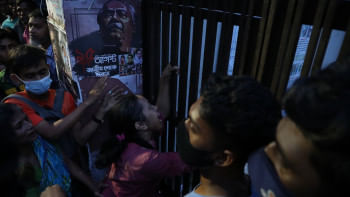End extrajudicial excesses

We are alarmed by the allegation that a 53-year-old convenience store owner in Sunamganj's Tahirpur upazila died on Tuesday after being beaten up by the police during an arrest attempt. According to Romij Miah's wife, Josna Begum, two people, who identified themselves as policemen, appeared at his shop in front of their home on a motorcycle and started hitting him in the chest. They grabbed him and continued to beat him up as they tried to mount him on the motorcycle. However, once he started bleeding from the nose and collapsed on the ground, the policemen left without arresting him, as locals in the area confronted them. Shortly after, he was pronounced dead at a nearby pharmacy.
Meanwhile—and perhaps predictably—the police have a different story. Denying allegations of physical torture, they claimed that the deceased died of exhaustion as he was running away from the police. Additional superintendent of police (crime and operations) of Sunamganj District Police told this daily that Romij Miah was suffering from breathing and heart issues and that they had found no sign of him being beaten up.
Romij's family confirmed that he was, indeed, suffering from health complications, which is why he was unable to withstand the physical abuse prior to his attempted arrest. Other eye witnesses at the time echoed Josna Begum's allegation that he was beaten up before he collapsed. Given the conflicting versions of events, it is imperative that an independent investigation is conducted into what really happened in Tahirpur upazila on Tuesday evening. But the question, as always, remains: who will conduct the investigation when the police themselves are the accused? What guarantee is there that they will not abuse their power to influence the post-mortem or investigation report?
There are clear sets of rules and laws demarcating what the police is allowed to do prior to an arrest and during police custody. Unfortunately, however, we have seen too many occasions where law enforcement agencies carried out judicial excesses, and too few instances where they were held accountable for it. If we are to end this culture of impunity, we must thoroughly investigate allegations such as Ramij's and take exemplary action against those found guilty.


 For all latest news, follow The Daily Star's Google News channel.
For all latest news, follow The Daily Star's Google News channel. 






Comments